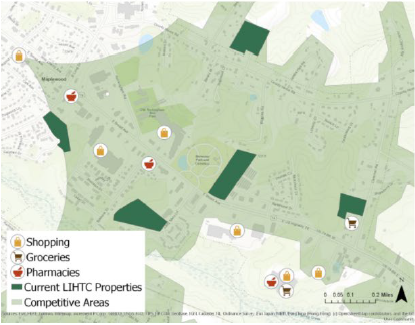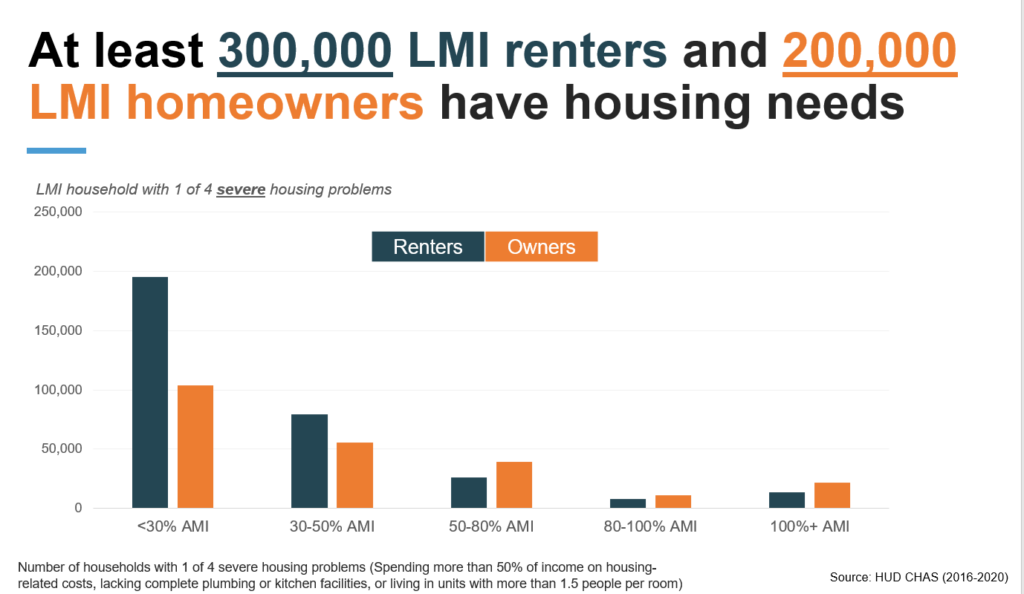Affordable Housing
AFFORDABLE HOUSING SERVICES
In response to growing demand, communities across North Carolina are increasingly focused on ensuring that residents have access to quality and affordable housing. According to data from the U.S. Department of Housing and Urban Development (HUD), roughly 30% of North Carolina households either struggle to afford their homes or are living in substandard and/or overcrowded housing. The rate of households with housing needs jumps to nearly 85% for low- and moderate-income households.
But the housing needs across jurisdictions are as diverse and complicated as the potential solutions. DFI helps its partners navigate the development tools available to them in order to drive development that meets local housing priorities. Like other real estate projects, developing and preserving affordable and quality housing is often a complex process involving a private developer, the local government, architects, investors, planning officials, the public, and other stakeholders.
DFI is available to assist communities at all stages, from municipalities wanting to better understand the problem to those prepared to implement a strategy but not sure how to proceed.
Visit the School of Government’s Community & Economic Development (CED) blog to learn about a range of topics related to affordable housing including primers on the low-income housing tax credit (LIHTC), local government legal authority, and updates on special funding sources such as the American Rescue Plan or CDBG for Disaster Recovery
What do you mean by affordable housing? How can local governments play a role?
AFFORDABLE HOUSING WORKSHOP
A DFI-led workshop on affordable housing educates local elected officials and staff on what “affordable housing” means and how local governments can play a role in preservation or development. DFI introduces key concepts and dives into development finance tools such as the Low-Income Housing Tax Credit (LIHTC). We will work with each local government to tailor the workshop to its needs.
Does my community need affordable housing?
HOUSING NEEDS ASSESSMENT
The DFI housing needs assessment provides a comprehensive overview of local housing markets, focusing particularly on the needs of extremely low-to moderate-income households. The assessment will help communities understand how broader demographic trends such as population growth or economic changes impact local housing markets and identify the type and scale of housing required to meet its residents’ needs.
We understand our housing needs and would like to implement a strategy to attract private investment. Where do we start?
IDENTIFICATION OF OPTIMAL SITES
Once a local government has identified its local housing needs, DFI can assist in identifying where to develop or redevelop affordable housing DFI utilizes various tools to identify publicly-or privately-owned properties suitable for the type of development desired by the local government. Among other factors, DFI considers the local public interests and requirements for potential federal and state funding sources to identify potential sites.
Once a site is selected, DFI can assist partners with a strategy for site control, if needed.

We already have a site in mind. What else do we need to attract a developer?
PRE-DEVELOPMENT PROCESS
Once a local government has control of a suitable site or sites, DFI can conduct a pre-development process to identify a feasible development plan and ultimately solicit a private development partner to execute on the local government’s vision. As part of the process, a community engagement strategy is developed to better understand the public interests related to housing development. Clients are presented with feasible development plans based on a housing needs assessment, conceptual site plans, and a financial feasibility assessment, enabling them to make informed decisions about the size and structure of their participation, if any. Various development finance tools are tested to maximize private and non-local investment. DFI supports the local government partner in the selection of a development partner and through the development agreement negotiations to ensure commitments are secured
We have been approached by a developer for an affordable housing project. How do we vet their proposal?
THIRD PARTY REVIEW
If a local government receives a proposal from a private developer for an affordable housing opportunity, DFI can conduct a Third-Party Review. DFI will provide an independent assessment of the feasibility of the deal, the public participation requested, and recommend alternative structures, if needed. Dependent on the client’s timeline, the process may include a high-level market analysis, development of a financial pro forma, and evaluation of the proposed site plans and structure of the proposed public participation. For more information and to request these services, contact Marcia Perritt at mperritt@sog.unc.edu.
Where has DFI Assisted with affordable housing projects in NC?
Durham County
Durham County engaged UNC DFI in May of 2017 to provide pre-development services for two County-owned sites on the 300 and 500 blocks of East Main Street in downtown Durham. The pre-development process involved several key components – public engagement, a parcel analysis to understand current conditions in downtown, a site-specific market analysis, site planning, and a financial feasibility analysis. Durham County worked with UNC DFI to identify site-specific public interests to guide the pre-development process.
DFI’s process resulted in the execution of development agreements with two nationally recognized developers for plans that met both public and private sector interests. The plans include over 300 apartments affordable to households earning between 30% and 80% Area Median Income (AMI), 200 market-rate apartments, significant ground-floor commercial space including a childcare center, and structured parking to serve both private and public uses. Units are currently under construction.
For more information on this project and updates, visit www.dconc.gov/EMainSt.
Rocky Mount and Lumberton
In November 2017, the North Carolina Emergency Management division (NCEM) engaged UNC DFI to assist with attracting private investment for the development of affordable housing for low and/or moderate-income households in Hurricane Matthew-impacted communities. The effort, known as Public-Private Partnerships (P3) for Housing, is now aligned with the NC Office of Recovery and Resiliency (NCORR) and leveraged State resources to create more privately owned affordable rental housing options outside of 100-year and 500-year flood zones. Following a pre-development process in Rocky Mount and Lumberton, the development partners selected have constructed 50 apartments affordable to households at 60% AMI and 66 apartments affordable to seniors at 50% AMI, respectively.
For more information on this program click here.
Siler City
UNC DFI evaluated financially feasible redevelopment options for the historic Henry B. Siler School in Siler City. Feasible options included an assisted living facility, low-income housing, and market-rate rental housing. Chatham County owned the school and wanted it used for affordable housing. In 2017, the county issued a Request for Proposals, emphasizing that the county was most interested in seeing the school utilized for affordable housing—and explicitly referred to DFI’s feasibility analysis that showed affordable housing was achievable at the site.
Stephanie Watkins-Cruz, Chatham County’s Policy Analyst who works with the county’s Affordable Housing Advisory Committee, said, “After seeing the potential of the Henry Siler School through DFI’s analysis, Chatham County was not only given options on what the highest and best use of the property should be, but guidance on the tools it could leverage to bring new affordable housing options to the county.” The project attracted a private developer (Third Wave Housing) and received an award of low income housing tax credits and other financing from the North Carolina Housing Finance Agency in 2018. According to Watkins-Cruz, the project will bring a “much needed” 44 new affordable housing units for low-income persons to Chatham County, and the county intends “to replicate this effort in the future.”
Dare County
Dare County engaged UNC DFI to identify opportunities for new development of affordable housing for low- and moderate-income households. Dare County is located in a Difficult Development Area (DDA) and the DFI housing assessment identified the specific challenges of maintaining an affordable housing supply in a tourism community. DFI identified several sites competitive for 9% LIHTC and is currently evaluating the potential for the conversion of a hotel to affordable apartments. DFI will conduct a pre-development process on select properties and help the County identify a development partner.


